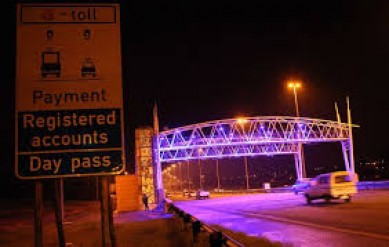Resistance to e-tolls is not about money

At least, Deputy President Cyril Ramaphosa should know it, but also in great part because he is a flyfisher, which by definition means he is a man of good character and superior intelligence, and possessed of goodwill towards his fellow citizens. We know this also because unless you’re a medical professional, it takes special fortitude and empathy to remove a fish hook from the flesh of a fellow flyfisher and still retain his friendship. Such an event (as related by Business Day columnist Allister Sparks) — in which Ramaphosa wielded the pliers and National Party negotiator Roelf Meyer was the beneficiary — became central to the myth of SA’s negotiated revolution.
However, now it seems the rainbow-babble has evaporated: we no longer trust the government, and certainly not with fish hooks.
Ramaphosa and his boss should know that it doesn’t matter how deeply the government discounts its e-tolls offer, Gauteng freeway users won’t pay. They won’t pay because the resistance to e-tolling is not about the money. Just as the anti-apartheid struggle was never about unfair wages but about being recognised as citizens, so e-tolling is about the utter disdain with which the government treats the citizens.
The resistance to e-tolling is a tax revolt about service delivery and electricity and land and water. It is about corruption from the lowliest traffic cop all the way to Nkandla. It is about the blue-light brigades and the bloated public service and the waste, overspending and ridiculously high pay packets in public office.
It is about crime and poverty and misery and the arms deal and Marikana and an endless succession of chief prosecutors, and because every time the state breaks the law we have to take it to court. It is because we have already paid for the privilege to drive to work on decent roads.
It is because we the people are unhappy with you the government.
The resistance to e-tolling is about the government refusing to take responsibility for its actions and blaming everything except itself for its troubles. It is about expecting Gauteng road users to help the government meet its debt obligations to avoid a ratings downgrade, as National Treasury deputy director-general Ismail Momoniat puts it,
The resistance to e-tolling is about the predictable yet disappointing way Ramaphosa suggests the changes indicate that his is "a listening, responsive, responsible and caring government", as reported by the SABC, while in the same announcement we are told that the government will use vehicle licence renewals to force us to pay e-tolls. The resistance is about the obscenely cynical way Ramaphosa, his boss and the rest of the government feed us ordure and expect us to like it.
The resistance to e-tolling, Mr Ramaphosa, is about you and your government being deaf to everything South Africans are telling you (except to what your sycophants say) and it is about your readiness to use administrative violence to force the people to obey. Perhaps that is something your government learnt from the apartheid regime, who knows? What we do know is that an oppressor will get his backside kicked, every time, exactly as the apartheid regime did.
Good luck with getting the hook out of your flesh, Mr Ramaphosa.
















